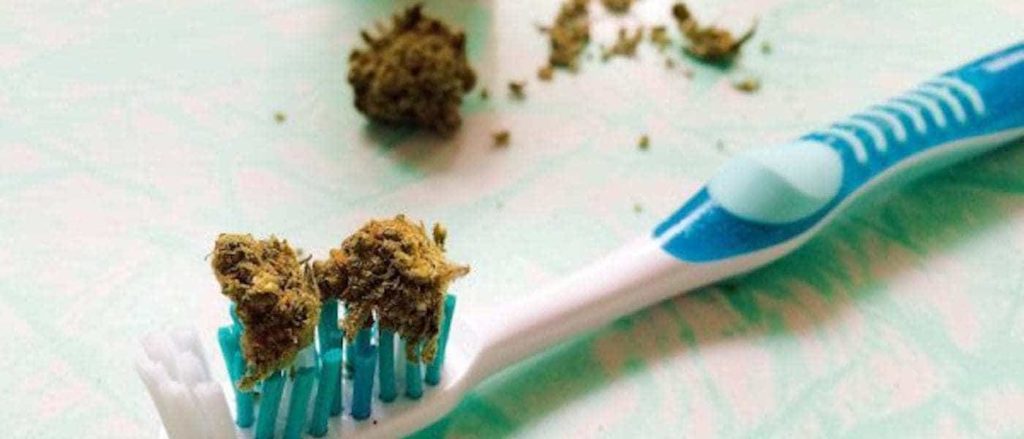A January 2020 study published in the Cureus Journal of Medical Science found something remarkable about marijuana’s effect on oral health. The study looked at the effect of marijuana or THC on dental plaque, a film that forms on the teeth and gums that can lead to heart disease. Examining the efficacy of multiple oral care products and cannabinoids together, researchers wanted to gauge which reduced plaque bacteria better.
Featuring 60 adults 18- to 65-years-old, individuals were screened for gum health and placed into six groups, based on their level of gum disease. Researchers scraped each individual in the six groups and placed the samples within individual Petri dishes by type.
The groups were separated by cannabis compounds, Dental plaques of the adults were collected using paro-toothpick sticks and spread on two Petri dishes, each with four divisions. On Petri dish-A, cannabidiol (CBD), cannabichromene (CBC), cannabinol (CBN), and cannabigerol (CBG) was used, and on Petri dish-B, cannabigerolic acid (CBGA), Oral B, Colgate, and Cannabite F (a toothpaste formulation of pomegranate and algae) were used.
Cannabis, popularly known as marijuana, is derived from the plant Cannabis sativa, which has gained enormous popularity recently owing to its multiple benefits, especially in the field of cosmetics and pharmacology [13]. Cannabinoids are a group of secondary metabolites produced by the small glands called trichomes present on the surface of the plant and act on the cellular cannabinoid receptors [14]. Approximately, more than 100 kinds of cannabinoids are produced by the plant
These cannabinoids present in Cannabis are known for their antibacterial properties. It has been found that some cannabinoids, such as CBD, CBC, CBG, CBN, and ∆9-tetrahydrocannabinol (THC), exert antibacterial activity against a variety of methicillin-resistant Staphylococcus aureus (MRSA) strains [17]. Cannabidiol has been identified as a component of hemp oil that is effective against gram-positive bacteria and yeast [18]. Wasim et al. (1995) tested ethanol and petroleum extracts of cannabis leaves against different microorganisms. The results showed that the extracts have strong inhibitory effects on both gram-positive bacteria (Bacillus subtilis, Bacillus pumilus, S. aureus,and Micrococcus flavus) and gram-negative bacteria (Proteus vulgaris and Bordetella bronchiseptica) [19].
To the best of our knowledge, no such study has been published that compares the efficiency of cannabinoids with that of oral care products against dental bacteria. Our study is the first of its kind conducted to compare the efficacy of well-established commercial oral care products and cannabinoids in reducing the bacterial content of the dental plaque. Reducing the bacterial content could significantly decrease and prevent gum diseases that have become a huge global burden owing to their direct relation with systemic diseases. Here we report a preliminary observatory study on effect of cannabinoids on reducing the bacterial content of dental plaque.
Consent was obtained by all participants in this study. AZ Groeninge Kortrijk; Belgium issued approval B39S201836215; AZGS2018028.
The content published in Cureus is the result of clinical experience and/or research by independent individuals or organizations. Cureus is not responsible for the scientific accuracy or reliability of data or conclusions published herein. All content published within Cureus is intended only for educational, research and reference purposes. Additionally, articles published within Cureus should not be deemed a suitable substitute for the advice of a qualified health care professional. Do not disregard or avoid professional medical advice due to content published within Cureus.
Conclusion
it was found that cannabinoids were more effective in reducing the bacterial colony count in dental plaques as compared to the well-established synthetic oral care products such as Oral B and Colgate.
Cannabinoids have the potential to be used as an effective antibacterial agent against dental plaque-associated bacteria. Moreover, it provides a safer alternative for synthetic antibiotics to reduce the development of drug resistance.
Cureus. 2020 Jan; 12(1): e6809.
Published online 2020 Jan 29. doi: 10.7759/cureus.6809
PMCID: PMC6991146
PMID: 32038896
This just gave wake and bake a whole new meaning..


